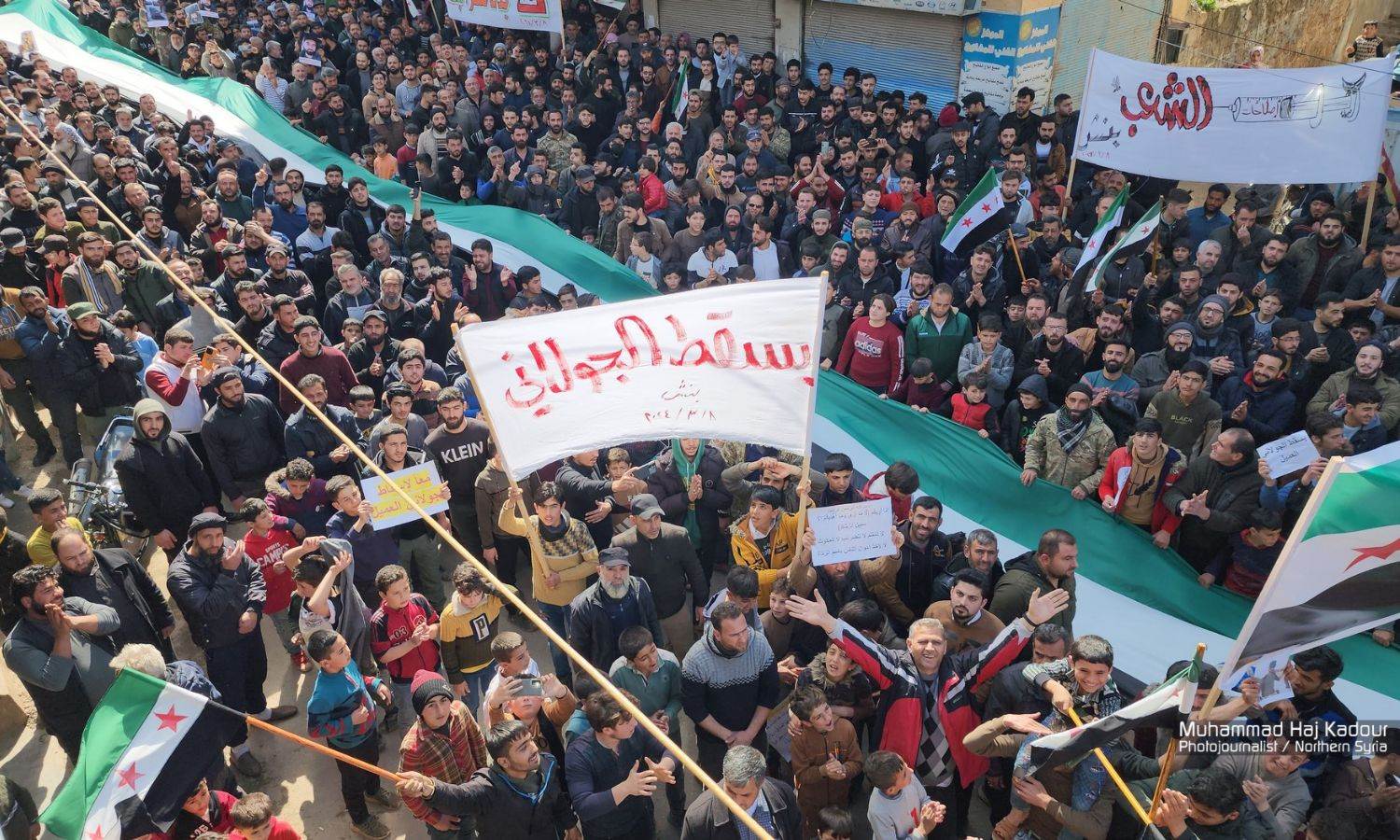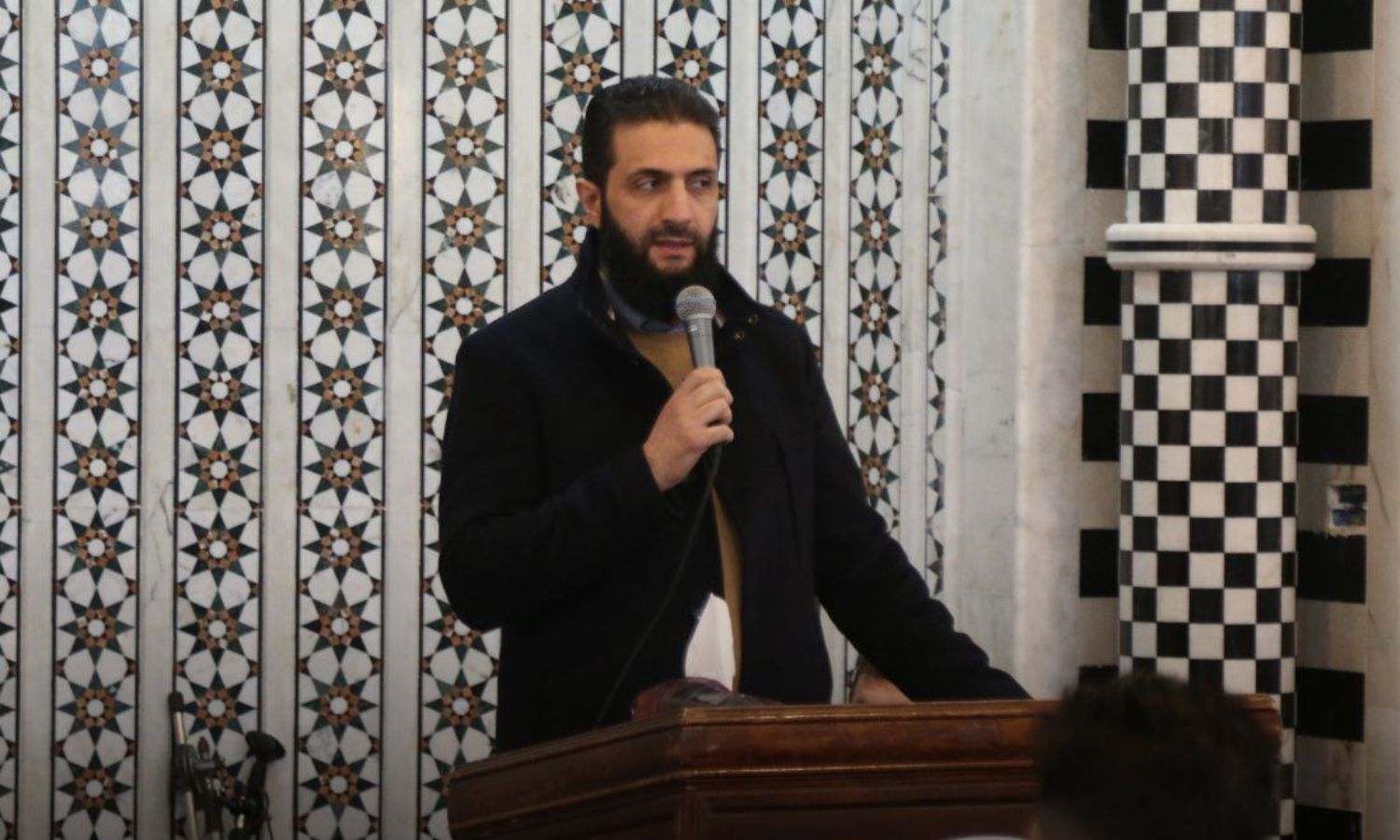



Enab Baladi – Hassan Ibrahim
The popular movement in the city of Idlib, northwest Syria, continues amid demands for the fall of Abu Mohammad al-Jolani, the leader of Hayat Tahrir al-Sham (HTS), which holds military control, and the rejection of its policy and monopolization of decisions.
The demonstrations expanded to include more than 15 protest points, despite the promises and reforms by the HTS and its political umbrella, the Syrian Salvation Government (SSG), which did not reduce people’s voices, and the demands of the demonstrators, including activists, civilians, military personnel, became clear for the fall of al-Jolani.
Among the most prominent actions of the HTS, the Salvation Government, and the General Shura Council were the issuance of a general amnesty for prisoners, with conditions and exceptions, the formation of committees to listen to residents, the cancellation of fees on buildings, and the exemption of a portion of them, and the meeting of al-Jolani with dignitaries in the region at different locations.
Signs of fatigue and torture were apparent on most of those released from Tahrir al-Sham prisons, after being detained for varying periods on charges of “treason.” On February 24, the family of member Abdul Qader al-Hakim, known as “Abu Ubaidah Tal Hadya“, from the Ahrar al-Sham faction, confirmed his death in Tahrir al-Sham prisons, following torture over the “treason” file, as he had been detained about ten months prior and was buried by the HTS five months ago without informing his family.
This incident spurred on the demonstrations that did not stop, followed by a pledge by the president of the Supreme Council for Fatwa in Tahrir al-Sham, Abdul Rahim Atoun, to visit the prisons and issue a general amnesty for prisoners and form a judicial committee to look into the rights of those released, according to a statement published on March 1.
On March 5, the Salvation Government issued a decree stipulating a general amnesty for perpetrators of crimes on the occasion of Ramadan, and approval of a general amnesty project, after obtaining a “good conduct and behavior” document, with conditions and exceptions.
The Minister of the Interior in the Salvation Government, Mohammad Abdul Rahman, said that the ministry released 420 prisoners under the amnesty decree, promising to release other numbers covered by the amnesty.
During a meeting published on March 6, with the General Shura Council and the Salvation Government, al-Jolani said that it is an authority’s duty to listen to the people’s demands and to implement those that are justified, and it is necessary to look at the reality objectively, saying “We are not clinging to anything at all, the easiest thing is to let the ship navigate on its own.”
On March 7, the HTS announced the exoneration of the faction’s second man, Abu Maria al-Qahtani, and his release after six months of detention over the “treason” file.
Nader al-Khalil, a fellow researcher at Omran for Strategic Studies, told Enab Baladi that the nature of the demands and especially the fall and departure of al-Jolani reveal a serious desire by a large part of the community, and about the size of the gap between the HTS’ two wings.

Abu Mohammad al-Jolani, commander of HTS, during the opening of the Zaid bin Harithah Mosque in Idlib city – March 10, 2024 (Al-Sham News Agency)
Regarding the HTS’ options in the face of the continuing protests and the demands for the downfall of al-Jolani and the rejection of the monopolization policy, Khalil said that the HTS faces difficult choices, and it is possible for Tahrir al-Sham to continue making promises and reforms in an attempt to calm the street, but it is clear that this step has not been sufficient so far.
He added that the options before the HTS are limited and all lead to a context of de-escalation, and to work on not extending the demonstrations and limiting the increase in the number of demonstrators. These options are mostly between forming committees that conduct rounds and meetings in an attempt to keep the last straw standing, and between mediators that can be made through a third party, such as sheikhs and neutral leaders in an attempt to bridge the gap between the security wing and the military wing, and between the various conflicting blocs within the HTS.
It also includes offering some concessions to the military wing which is important in mobilizing part of the demonstrations, which suffered from marginalization over the past years, according to the researcher.
These concessions, according to the researcher, may include restructuring part or all of the Shura Council in a way that ensures the military wing and marginalized blocs have seats and a role in it, with changes in the General Security Service in favor of the military wing, the marginalized section as well.
The researcher considered what the HTS is currently executing is “bending until the storm passes,” for the demonstrations are demanding the departure of al-Jolani, and they use slogans similar to those against Syrian regime’s president Bashar al-Assad, and it is likely that al-Jolani will deal with them with “pragmatism” to strike again at a later time, after things stabilize.
Areas under Tahrir al-Sham control witnessed several demonstrations over past years, and demands that did not reach calling for the fall of al-Jolani, the most prominent of which carried demands for the leaving of Tahrir al-Sham out of Idlib.
The way the HTS has dealt with the demonstrations and criticisms has varied, including arbitrary arrests of some activists without judicial warrants, and arresting those who criticize through social networks, and some reached the point of firing shots and killing two young men, as occurred in 2020.
Researcher Nader Khalil believes that a security solution might be an option given the continued tensions and protests, and their significant expansion. However, this approach is fraught with risks and requires very cautious handling to avoid exacerbation of the situation and destabilization of the region. The HTS must take into account the people’s demands and work on finding comprehensive and sustainable solutions to the current crisis.
Khalil mentioned that avoiding a security confrontation may allow or encourage the continuation of demonstrations and therefore the fall of the fear factor and the fall of the HTS’ prestige, which it worked on accumulating through its previous operations and movements. He considered that the HTS and its leader made a mistake in dealing with the “treason” file by resorting to a security solution.
The researcher suggests that the likelihood of not repeating the mistake (the security solution) is considerable due to the great harm that would ensue, shattering the HTS’ centrality and possibly resulting in a “bloody conflict” between two highly armed and trained wings.
For his part, researcher of jihadist groups, Orabi Orabi, told Enab Baladi that the HTS is serious about attempting reforms and racing against time to absorb the protesters and stop the protests, considering the general amnesty as a means to relieve popular tension, and that reforms, promises, and peaceful solutions take weeks.
Orabi believes that if the protests do not stop, a “local internal strife” or chaos might arise, which the HTS could exploit to intervene and say that the protests are causing local strife, and resort to a certain type of repression.
Hayat Tahrir al-Sham first appeared in Syria in early 2012 under the name “al-Nusra Front for the People of the Levant,” a faction distinguished by departing from al-Qaeda, one of the most prominent “jihadist” factions on the global stage. It later announced its separation from any organization and deemed itself a local Syrian force.
For a year, Tahrir al-Sham has been living through internal disputes and conflicts between its currents and first-line leaders, starting from the “collaboration and infiltration” file, to the defections, the exchange of accusations, and talks about a coup and internal liquidations.
Currently, the “collaboration” file has calmed down after the suspension of duties of the second man, Abu Maria al-Qahtani, his six-month detention, and his release; and the defection of the third leader, Jihad Issa al-Sheikh (Abu Ahmad Zakour), who revealed cases that the leader of the faction Abu Mohammad al-Jolani was responsible for, including explosions and cooperation with foreign intelligence.
In May 2013, the United States listed al-Jolani as a “Specially Designated Global Terrorist,” and in May 2017, the FBI offered a reward of $10 million for information leading to the identification or location of al-Jolani.
Regarding a question posed by Enab Baladi to the former leader Jihad Issa al-Sheikh concerning al-Jolani’s sole responsibility for setting the HTS’ strategies, changing its discourse, and its external communications, and who participates with him in this process, Abu Ahmad Zakour answered that al-Jolani is the sole commander.
if you think the article contain wrong information or you have additional details Send Correction